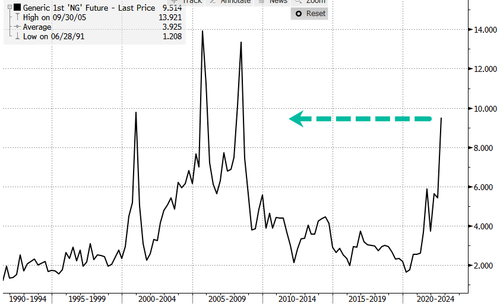NatGas Prices At 14-Year High As Traders Warn Of Winter Tightness
The explanation for US natural gas prices at 14-yeah highs, in our view, are concerns that increasing domestic and European demand for the fuel will result in tighter US supplies ahead of the winter season. A lot of NatGas has been pumped to power plants this summer as cooling demand surged, sending stockpiles for the coldest months of the year below 10% of normal levels.
Traders and research desks also focus on reopening Freeport LNG Terminal in Quintana, Texas, in October, which would boost US Gulf exports to Europe and result in even tighter US supplies.
On Thursday morning, New York NatGas futures are up more than 2% to $9.30/mmbtu after the EIA reported a smaller-than-expected injection to domestic winter reserves. Prices are steadily approaching $10/mmbtu and are currently at the highest price since 2008.
“Natural gas supply & demand dynamics have continued to pull the market higher,” Houston-based energy firm Criterion Research wrote in a note.
“Natural gas production has had a few individual days with impressive prints near record-highs, but it has been unable to sustain those numbers amid a myriad of pipeline maintenance events and outages across the country. Concurrently, low renewables (ie wind) have contributed to very strong natural gas burns within the United States. Weak coal storage inventories and an overall lack of coal power are compounding with the lackluster wind as well, leading to impressive gas burns throughout the last few months.
“Looking ahead, Freeport LNG is expected to roar back online in October, adding another 2 Bcf/d to the mix and keeping balances tight for the winter season,” the energy firm said.
BloombergNEF data shows domestic NatGas output has fallen 1 billion cubic feet a day since the peak at 98.7 billion cubic feet in the week ended Aug. 6. The declines are problematic because this is the time domestic winter reserves are injected with NatGas to prepare for the US heating season just ten weeks away.
Gary Cunningham, a director at Tradition Energy, told Bloomberg that faltering production at wells is bidding up prices:
“You’re just sort of feeding gasoline into the fire, which drives the bulls,” Cunningham said.
Tight supplies in the US come as Europe wrestles with a historic energy crisis due to backfiring Western sanctions on Russia.
So the question now is if the move over $9/mmbtu is sustainable, and if so, a break over the $10 handle could suggest another leg higher, as explained by analysts at EBW AnalyticsGroup.
Tyler Durden
Thu, 08/18/2022 – 13:20

